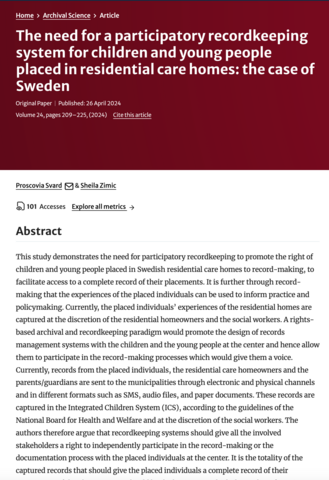This study demonstrates the need for participatory recordkeeping to promote the right of children and young people placed in Swedish residential care homes to record-making, to facilitate access to a complete record of their placements. It is further through record-making that the experiences of the placed individuals can be used to inform practice and policymaking.
Currently, the placed individuals’ experiences of the residential homes are captured at the discretion of the residential homeowners and the social workers. A rights-based archival and recordkeeping paradigm would promote the design of records management systems with the children and the young people at the center and hence allow them to participate in the record-making processes which would give them a voice. Currently, records from the placed individuals, the residential care homeowners and the parents/guardians are sent to the municipalities through electronic and physical channels and in different formats such as SMS, audio files, and paper documents.
These records are captured in the Integrated Children System (ICS), according to the guidelines of the National Board for Health and Welfare and at the discretion of the social workers. The authors therefore argue that recordkeeping systems should give all the involved stakeholders a right to independently participate in the record-making or the documentation process with the placed individuals at the center.
It is the totality of the captured records that should give the placed individuals a complete record of their experiences of the placements. It should be the basis upon which the quality of care is assessed and improved. Two case studies were used to access the information management environment. The placed children should have a right to access all the records captured in the recordkeeping system to give them an understanding of their lives in the present and the future.

